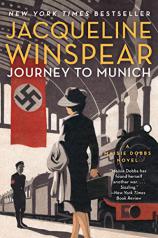Reading Group Guide
Discussion Questions
Journey to Munich: A Maisie Dobbs Novel

1. As the novel begins, Maisie is in a profound state of grief. How does this affect her behavior or decisions? How does this emotional weight evolve or change throughout the novel?
2. Despite her suffering, Maisie realizes that “tending the terrible wounds of those who fought for freedom from oppression…lifted her own deep melancholy.” How is it that such traumatic service can be uplifting?
3. What might Maisie mean when she says that her challenging time in Spain helped her rediscover “the raw material of her character”? What is the essence of her character?
4. What particular skills does Maisie possess that makes Robert MacFarlane want her for this particular mission in Munich?
5. In what ways does Gilbert Leslie, seemingly a mere administrator, prove important to Maisie? What does his background add to the complexity of their time in Munich?
6. Who --- John Otterburn, Elaine Otterburn, James himself --- is responsible for James’ tragic death? Why?
7. Maisie admits to feeling “at sea, adrift,” and with “no anchor.” In what various ways is this true? How does this affect her behavior? In what ways might such a state of disconnect be helpful?
8. Maisie consistently considers the connections between her physical, emotional and spiritual self. How are they connected? When and how is this awareness particularly important for her?
9. In what situations is Maisie’s work made more difficult because she is a woman? How does she respond to the unfair challenge of such inequality?
10. How does Maisie come to accept, forgive, and even help Elaine after her role in James’ death?
11. Consider Maurice’s teaching about the balance of opposites in human behavior, that to have too little of something (water, love, etc.) often causes dangerous, over compensatory behavior. How is this insight helpful to Maisie?
12. Maisie often meditates, imagines, or visualizes before dangerous encounters. What’s the value of such activity? How does it work?
13. In what ways is Mark Scott helpful or harmful to Maisie? What does she dislike about him? What does she come to appreciate?
14. The image of two young girls playing in secret behind an abandoned building in Munich is very powerful for Maisie. What does it represent?
15. Maisie admits to gradually learning that “wisdom [is] to be found in forgiveness.” What does this mean? How might it serve her?
16. After the mission, Maisie reflects upon Maurice’s teaching that “everyone has the capacity for evil.” What did he mean? What are the implications --- personally, socially, politically --- of such a truth? What are the best ways to prevent such a capacity from actualizing?
Journey to Munich: A Maisie Dobbs Novel
- Publication Date: February 14, 2017
- Genres: Fiction, Historical Fiction, Historical Mystery, Mystery
- Paperback: 320 pages
- Publisher: Harper Perennial
- ISBN-10: 0062220616
- ISBN-13: 9780062220615








